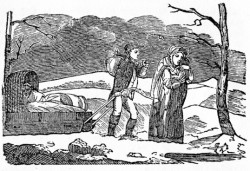When was “the year without summer?”
 June 6, 1816 — Today begins a”the year without summer,” when cold temperatures affected the entire country. New England suffered through the most severe temperature drop, and got 10 inches of snow. An agriculture disaster of great proportion, the low temperatures killed the roots or stunted growth of almost all crops in the northern regions.
June 6, 1816 — Today begins a”the year without summer,” when cold temperatures affected the entire country. New England suffered through the most severe temperature drop, and got 10 inches of snow. An agriculture disaster of great proportion, the low temperatures killed the roots or stunted growth of almost all crops in the northern regions.
According to Meteorologist Lee Foster: The indications of a possible cool summer were evident during the spring time. The middle of May brought unseasonably cool temperatures to the region with light snow reported in Quebec Province with frost as far south as Virginia. Mild and sunny conditions returned to the Northeast by the last week of May before a strong cold front crossed New England on the 28th with light snow again reported in Quebec and frost as far south as Pennsylvania. Reports of fruit trees being set back and acres of corn killed in Maine were common.”
Sources
Words of Wisdom
After a warm start to June, the month quickly turned stormy. A strong Nor’easter developed along the east coast on the 6th with rain mixed with snow in Quebec City and light snow observed over the highlands of New York and most of Northern New England. As this winter type storm moved into the Canadian Maritimes on the 7th, the storm dumped 6 to 12 inches of snow over most of Northern New England with reports of 2 foot drifts in Quebec City. Strong high pressure followed the storm from the 8th through the 10th with frost every morning and reports of trees blackened or scorched across most of New England. By the end of the month the weather became more typical of June with even a heat wave from the 22nd through the 24th.
If June was bad enough, July started out no better. A strong Canadian cold front crossed New England killing corn, beans, cucumbers and squash and the first talk of famine started. However, by the middle of the month, thoughts of a famine were almost forgotten as the hardy grains such as wheat and rye along with potatoes were doing quite well.





